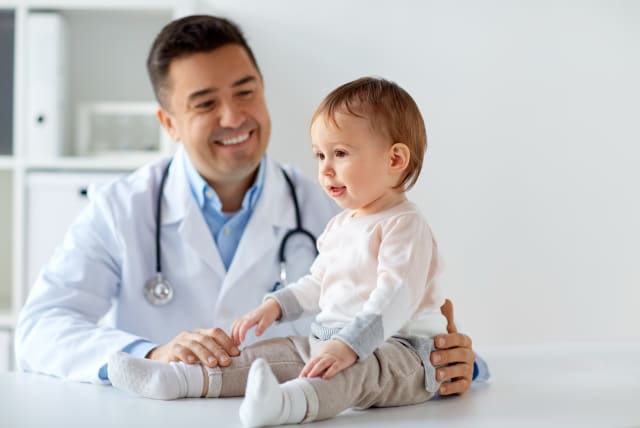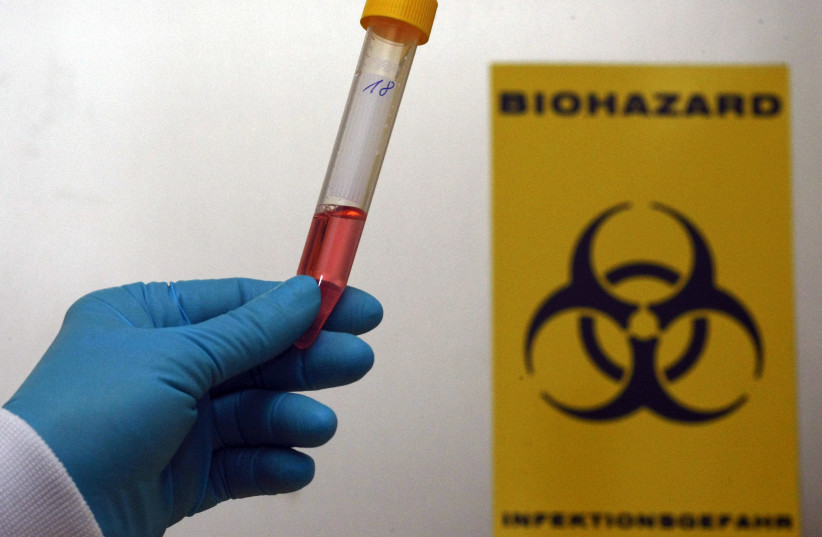Nitric oxide an effective treatment for babies with bronchiolitis - study

An Israeli team found that treatment with inhalations of nitric oxide (NO) is a safe and effective treatment for babies with bronchiolitis.
Bronchiolitis is a common chest infection that affects babies and children under the age of two years, especially in the autumn and winter and causes the accumulation of mucus and phlegm in the small airways (bronchioles), resulting in partial blockage. It is the leading cause in the Western world for hospitalizations of babies before their first birthday.
It's usually mild and can be treated at home, but it can be serious. Bronchiolitis starts out with symptoms similar to those of a common cold but then progresses to coughing, wheezing and sometimes difficulty breathing. Symptoms of bronchiolitis can last for several days to weeks. Most infected children get better with care at home, but a small percentage of children require hospitalization.
Bronchiolitis is different from bronchitis, which causes a cough with lots of mucus and can affect people of all ages. Until now, there has been no treatment for the disease, also called bronchiolitis, and many studies have been carried out in an attempt to find a cure.
Now there is a new treatment option for babies who suffer from viral pneumonia led by Prof. Aviv Goldbart, director of the children's department and a specialist in lung diseases in children at Soroka University Medical Center in Beersheba and conducted simultaneously on 100 babies at Soroka, Shaare Zedek, Carmel, Dana-Dwek (of Tel Aviv Sourasky), Emek, Sheba and Schneider Children’s Medical Center.
The study has just been published in the prestigious journal Annals of the American Thoracic Society (ATS).
Researchers find effective bronchiolitis treatment
The team found that treatment with inhalations of nitric oxide is a safe and effective treatment for babies with bronchiolitis. Goldbart, director of the pediatric department B at Soroka, said that “this study is a significant step that reinforces previous data regarding the treatment with nitric oxide in babies with respiratory infections.”
High-dose nitric oxide inhalation is a development of the firm called Beyond Air, an American public company traded on NASDAQ with an Israeli development center that manufactures and sells unlimited, on-demand generation of nitric oxide from room air, regardless of dose or flow, without cylinders of gas.
Nitric oxide has been used for many years in the treatment of premature infants and even adults with pulmonary hypertension. “The method we used to administer the preparation at a higher concentration results in two effects – an antiviral effect and at the same time dilation of pulmonary blood vessels and improvement of blood flow in the lung to the diseased areas,” explained Goldberg. “We were happy to see that the patients treated with nitrous oxide improved quickly and at the same time showed no side effects.
Most cases of bronchiolitis are caused by the respiratory syncytial virus (RSV), which is common and infects almost every child under two years. Outbreaks of RSV infection occur every winter, and babies can be reinfected, as the previous infection does not appear to cause lasting immunity. Babies are usually sick for seven to 10 days. They are infectious in the first few days of illness.
bronchiolitis' symptoms and how to treat them
For the first few days, the signs and symptoms of bronchiolitis are similar to those of a cold – a runny or stuffy nose, cough and sometimes a slight fever.
After this, there may be a week or more of difficulty breathing or a whistling noise when the child breathes out (wheezing). Many infants also have an ear infection (otitis media).
If not serious and treated at home, make sure your baby gets enough fluids. Give paracetamol or ibuprofen; keep the infant far away from cigarette smoke; and avoid spreading the virus. If it’s difficult to get the baby to eat or drink and his or her breathing becomes more rapid or labored, call your pediatrician. This is especially important if your child is younger than 12 weeks old or has other risk factors for bronchiolitis including premature birth or a heart or lung condition.
Jerusalem Post Store
`; document.getElementById("linkPremium").innerHTML = cont; var divWithLink = document.getElementById("premium-link"); if (divWithLink !== null && divWithLink !== 'undefined') { divWithLink.style.border = "solid 1px #cb0f3e"; divWithLink.style.textAlign = "center"; divWithLink.style.marginBottom = "15px"; divWithLink.style.marginTop = "15px"; divWithLink.style.width = "100%"; divWithLink.style.backgroundColor = "#122952"; divWithLink.style.color = "#ffffff"; divWithLink.style.lineHeight = "1.5"; } } (function (v, i) { });

